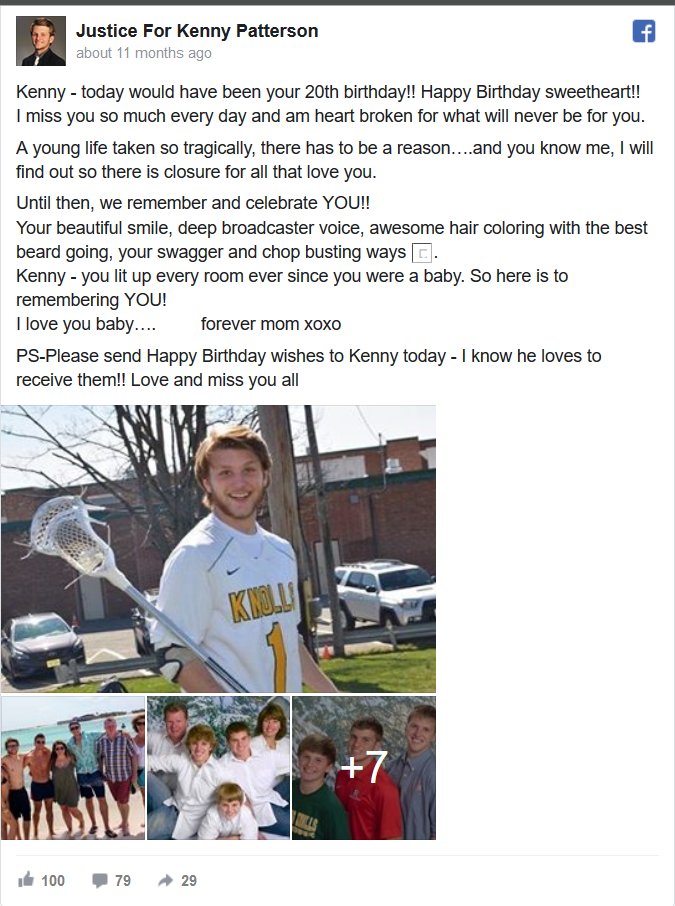Tag: rutgers
Mom of Rutgers U. freshman killed by train sues school, fraternity where he was partying
The mother of a Rutgers University student who was struck and killed by a train after leaving a fraternity party in 2017 has filed a wrongful death suit against the university, the police department, and the fraternity.
Claudia Patterson, the mother of freshman Kenneth Patterson, filed suit in Superior Court of Middlesex County in Dec. 2019, saying that Theta Delta Chi, the fraternity that threw the party, was under disciplinary action, and Rutgers should have known they were serving alcohol anyway.
A university spokesperson declined to comment on the pending litigation, but said Rutgers cooperated with the Amtrak Police Department during the investigation.
“The University was deeply saddened by the death of Kenneth Patterson and offered our condolences to his family and counseling services to our students affected by this tragic loss,” Neal Buccino said in a statement sent to NJ Advance Media.
Patterson, a native of Rockaway, was killed the night of Theta Delta Chi’s TDXmas party on Dec. 9, 2017, the suit says. He was drunk when he left the Huntington Street frat house, and was later struck and killed by an Amtrak train trying to walk back to his dorm room, a friend told the Daily Record.
Theta Delta Chi was under sanctions not to hold any parties or fraternity related events at the time, the suit says, but it’s not clear why. The fraternity did not return NJ Advance Media’s request for comment.
The fraternity “acted with complete disregard for the safety of others” in giving alcohol to underage students, the suit says. It also alleges that Rutgers failed in their duty to oversee fraternity events on campus.
In addition to the lawsuit, the Patterson family has launched the “Justice for KJP” initiative on social media, looking for more information on what happened between the time Kenneth Patterson left the party and his death.
“We still have no answers but you have great friends who celebrate your beautiful, vibrant life with us. I miss you every day and hope one day we find out the real story,” Claudia Patterson wrote on the second anniversary of his death.

Article via NJ
Botnet hackers that caused huge Internet blackout did it for money, revenge
Botnet hackers that caused huge Internet blackout did it for money, revenge
A New Jersey man has pleaded guilty to computer crimes charges for an online attack that caused a massive Internet outage last year, according to federal court documents unsealed Tuesday.
The Justice Department says Paras Jha, an ex-Rutgers student, built the Mirai botnet, which operated hundreds of thousands of infected household devices to flood websites with traffic, knocking out services such as Netflix and PayPal. The plea agreement was filed Dec. 5 in federal court in Alaska.
Dalton Norman and Josiah White were charged with helping Jha and also pleaded guilty last month.
The plea agreement says Jha and his cohorts built the botnet to launch denial of service attacks against business competitors and others against whom they held grudges and to make money from renting the botnet to others. They also wanted to extort money from companies that either were under attack or wanted to avoid being attacked, it said.
The Mirai botnet infected Internet-connected devices with malicious software to launch a series of attacks on websites. Among the targets was an Internet infrastructure firm, Dyn.
The program allows even unskilled hackers to take over Internet-connected devices and use them to launch distributed denial of service, or DDoS attacks. The software spreads via the Internet, taking over DVRs, cable set-top boxes, routers and even Internet-connected cameras used by stores and businesses for surveillance.
In the past, such DDoS attacks were accomplished by hijacking computers with malicious software and turning them into a robot network, or botnet, that sent the messages.
Mirai and other software available online now focus on compromising devices that are connected to the Internet but that most consumers don’t think of as computers, the so-called Internet of Things.
Jha and his cohorts made more than $180,000 leasing access to others who made money by directing fake Internet traffic to ads on infected websites, the plea agreement says.


